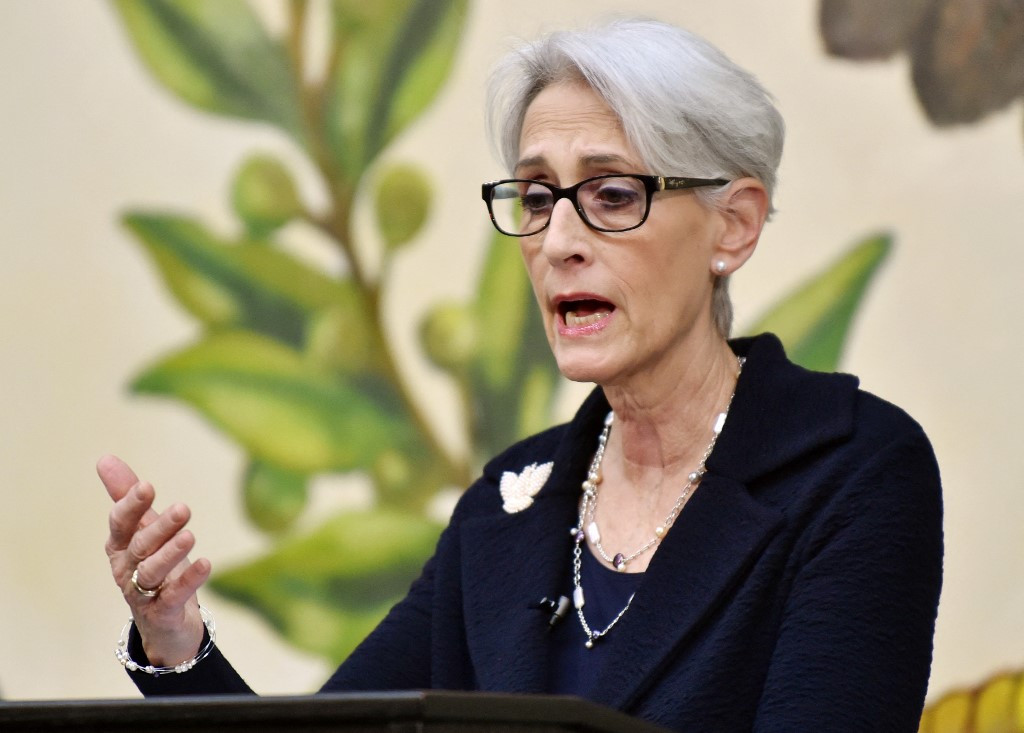Popular Reads
Top Results
Can't find what you're looking for?
View all search resultsPopular Reads
Top Results
Can't find what you're looking for?
View all search resultsTop US official to visit China Sunday amidst tension
Sherman's two-day trip to Tianjin, which comes as part of her ongoing Asia tour, may lay the groundwork for a potential face-to-face summit between US President Joe Biden and Chinese President Xi Jinping amid increasing rivalry between the two countries. If realized, it would be the first in-person meeting of the two leaders since Biden took office in January.
Change text size
Gift Premium Articles
to Anyone
D
eputy Secretary of State Wendy Sherman will travel to China from Sunday to hold talks with Foreign Minister Wang Yi and others, the State Department said, making it the highest-level visit by a US official to China in months.
Sherman's two-day trip to Tianjin, which comes as part of her ongoing Asia tour, may lay the groundwork for a potential face-to-face summit between US President Joe Biden and Chinese President Xi Jinping amid increasing rivalry between the two countries. If realized, it would be the first in-person meeting of the two leaders since Biden took office in January.
The planned discussions are "part of ongoing US efforts to hold candid exchanges" with Chinese officials to advance US interests and values and to "responsibly manage the relationship," the department said Wednesday in a press release.
The deputy secretary will also discuss areas where the United States has "serious concerns" about Beijing's actions, as well as areas where US interests align, it added.
A Chinese Foreign Ministry spokesperson said Sherman's visit was arranged based on a proposal from the United States, according to the official Xinhua News Agency.
Sherman's itinerary for her Asia trip initially only mentioned Japan, South Korea and Mongolia. However, the State Department added Wednesday that she will also travel to Oman on Tuesday after staying in the northeastern Chinese city of Tianjin.
The department's spokesman Ned Price told a press conference later in the day that Washington has decided to move ahead with the senior-level engagement with Chinese officials as it expects the upcoming talks have the potential to be "substantive and constructive."
"The deputy intends for this engagement to show and to demonstrate to the PRC what responsible and healthy competition can look like," Price said, using the acronym of the People's Republic of China.
While the United States welcomes "stiff competition" with the world's second-largest economy, it wants to ensure the rules of the game are clearly defined and enforced, and that there are "guardrails" so that "competition doesn't spill over into something more dangerous including, at worst, conflict," Price added, quoted by Kyodo News.
China's state-run Global Times, a tabloid that reflects nationalist views, quoted an expert saying that "a more stable China-US relationship will benefit the world," but also warning there may be no further talks depending on what Sherman tries to discuss.
If the United States brings up concerns about rights in Hong Kong and Xinjiang, "they have to know they are wasting time," it quoted another expert as saying, AFP reported.
The trip will not have the trappings of a full-fledged official visit. Sherman will not go to Beijing, but instead spend two days starting Sunday in Tianjin, an eastern port city.
She will meet senior officials in Tianjin, including Foreign Minister Wang Yi, the State Department and Chinese foreign ministry said.
John Kerry, the former secretary of state turned US climate envoy, is the only other senior official from the Biden administration to have visited China, as the world's two largest emitters pledged to work together on the planetary crisis, despite their differences.
Kerry did not hold talks in the capital either, but met with his climate counterpart in Shanghai, where there were few public sightings of the usually media-friendly former senator.
The United States and China have been at odds over a number of issues, including Beijing's alleged human rights abuses in Xinjiang, its crackdown on democracy in Hong Kong, its posing of security challenges to Taiwan and its assertiveness in the East and South China seas.
The first high-level in-person contact between the two countries under Biden's presidency took place in March in Alaska, joined by Secretary of State Antony Blinken and National Security Adviser Jake Sullivan from the United States as well as China's top diplomat Yang Jiechi and Wang.
At the time, the top diplomats engaged in rare sparring in front of TV cameras over their differing visions for the international order and their respective positions on human rights and democracy issues, among other topics.
In April, US climate envoy John Kerry traveled to Shanghai for discussions with his counterpart on tackling climate change, becoming the first senior official under the Biden administration to visit China.
Price said the United States, including through the Alaska meeting and other bilateral engagements, is seeking to determine "how we can most effectively ensure that the (bilateral) relationship is conducted on a level playing field, that those guardrails are there, and that it is managed responsibly."
But tense exchanges may be expected again in the upcoming meeting in Tianjin, with Xinhua reporting that Beijing plans to demand the US side stop interfering in China's "internal affairs" and harming its interests.










